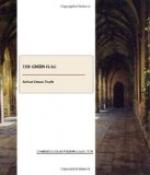The first officer seemed bitterly disappointed at my decision.
“Surely, sir, you are not superstitious about it,” said he, with a slight sneer upon his thin lips. “If it gets out of our own hands, and we don’t see for ourselves what is inside it, we may be done out of our rights; besides—”
“That’s enough, Mr. Armstrong,” said I, abruptly. “You may have every confidence that you will get your rights, but I will not have that box opened to-night.”
“Why, the label itself shows that the box has been examined by Europeans,” Allardyce added. “Because a box is a treasure-box is no reason that it has treasures inside it now. A good many folk have had a peep into it since the days of the old Governor of Terra Firma.”
Armstrong threw the screwdriver down upon the table and shrugged his shoulders.
“Just as you like,” said he; but for the rest of the evening, although we spoke upon many subjects, I noticed that his eyes were continually coming round, with the same expression of curiosity and greed, to the old striped box.
And now I come to that portion of my story which fills me even now with a shuddering horror when I think of it. The main cabin had the rooms of the officers round it, but mine was the farthest away from it at the end of the little passage which led to the companion. No regular watch was kept by me, except in cases of emergency, and the three mates divided the watches among them. Armstrong had the middle watch, which ends at four in the morning, and he was relieved by Allardyce. For my part I have always been one of the soundest of sleepers, and it is rare for anything less than a hand upon my shoulder to arouse me.
And yet I was aroused that night, or rather in the early grey of the morning. It was just half-past four by my chronometer when something caused me to sit up in my berth wide awake and with every nerve tingling. It was a sound of some sort, a crash with a human cry at the end of it, which still jarred on my ears. I sat listening, but all was now silent. And yet it could not have been imagination, that hideous cry, for the echo of it still rang in my head, and it seemed to have come from some place quite close to me. I sprang from my bunk, and, pulling on some clothes, I made my way into the cabin. At first I saw nothing unusual there. In the cold, grey light I made out the red-clothed table, the six rotating chairs, the walnut lockers, the swinging barometer, and there, at the end, the big striped chest. I was turning away, with the intention of going upon deck and asking the second mate if he had heard anything, when my eyes fell suddenly upon something which projected from under the table. It was the leg of a man—a leg with a long sea-boot upon it. I stooped, and there was a figure sprawling upon his face, his arms thrown forward and his body twisted. One glance told me that it was Armstrong, the first officer, and a second that he was a dead man. For a few moments I stood gasping. Then I rushed on to the deck, called Allardyce to my assistance, and came back with him into the cabin.




